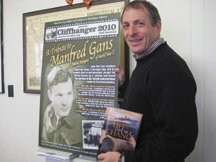Hoboken’s leafy squares, bustling shops, and friendly neighborhoods couldn’t be further from a place called Terezin: a grim, bricked fortress northwest of Prague where the Gestapo set up a concentration camp for Jews. Many of them were transported from there to the ovens of Auschwitz during World War II.
Manfred Gans experienced both extremes.
“He believed that things could and would be able to improve.”—Daniel Gans
________
The elder Gans died last fall, but not before writing it all down in the book Life Gave Me a Chance. Recently, Daniel Gans shared the story at the Hoboken library.
Germany then
Born into a Germany of economic turmoil, the elder Gans made his way to an easier life in England before World War II. When war broke out he joined a special commando unit of the British Army, along the way achieving the rank of captain. By the time armistice was declared, he was only 24 years old.
The story might have ended there except for the fact that Manfred got word that his parents were imprisoned at the camp in Terezin. Captain Gans ordered a sergeant to drive them to Czechoslovakia. In a gripping tale worthy of The Great Escape — involving Russian soldiers, Gans’ own cunning and courage, and even the Queen of the Netherlands — his parents were freed and lived in the Netherlands until 1954, when they immigrated to Israel.
Only in America
But Manfred Gans’s compass was pointed west. What brought him to New York?
“One thing was love and the other was business,” said Daniel, CEO of the Hoboken Brownstone Company.
Apparently Daniel’s parents’ families knew each other back in Germany. His mother’s family had moved to New York in 1938, and after the war his mother started writing letters to his father. After exchanging letters, Manfred came to New York and fell in love with his ardent correspondent.
He attended MIT, earning a master’s degree in chemical engineering in 1951, and went on to become senior vice president for technology at a chemical engineering company in New York, one of the best in the world at the time. Later he started a chemical engineering consulting company in Hoboken.
Keeping the flame
Of Daniel’s talk at the library, he said last week, “[My father] was not able to do it. That is exactly why I am doing it.”
The book, he said, “has relevance to the world we live in. There are important lessons that are there for us to study. There always are in history. A large part is tolerance and making sure people know each other.”
When Manfred died in September, he was remembered both in Europe and the United States. “He was a realist and an idealist who believed in discussion and that things could and would be able to improve,” Daniel said.
Manfred was “more proud of what he accomplished after the war,” Daniel added. “People looked at him as a hero, but he said he was not a hero. During the war he did what he had to do. The heroes were the guys who didn’t make it.”
Daniel added, “He was a wonderful mentor. It’s a wonderful opportunity to think about a guy who I loved and had the greatest respect for in every way.”
Life Gave Me a Chance is available at amazon.com, lulu.com, and the Hoboken Public Library.
